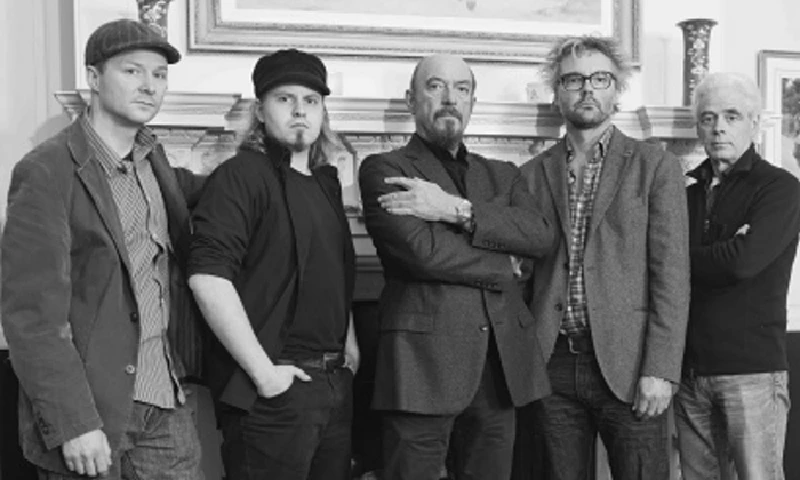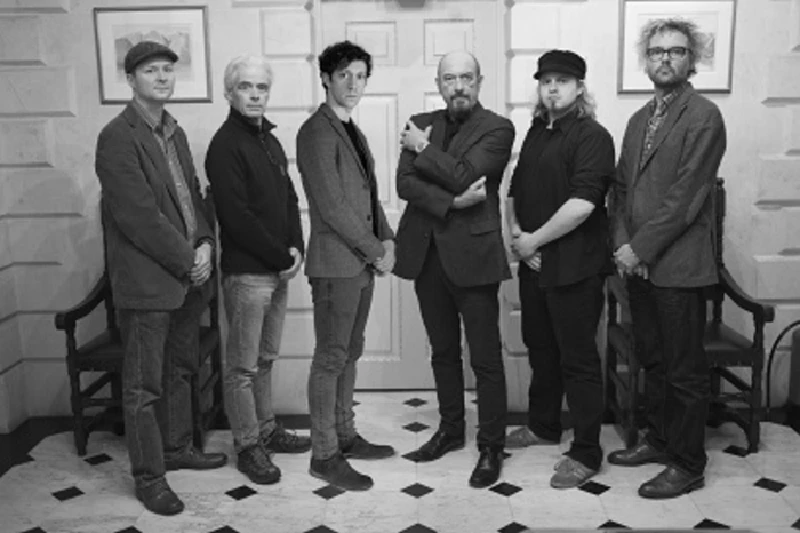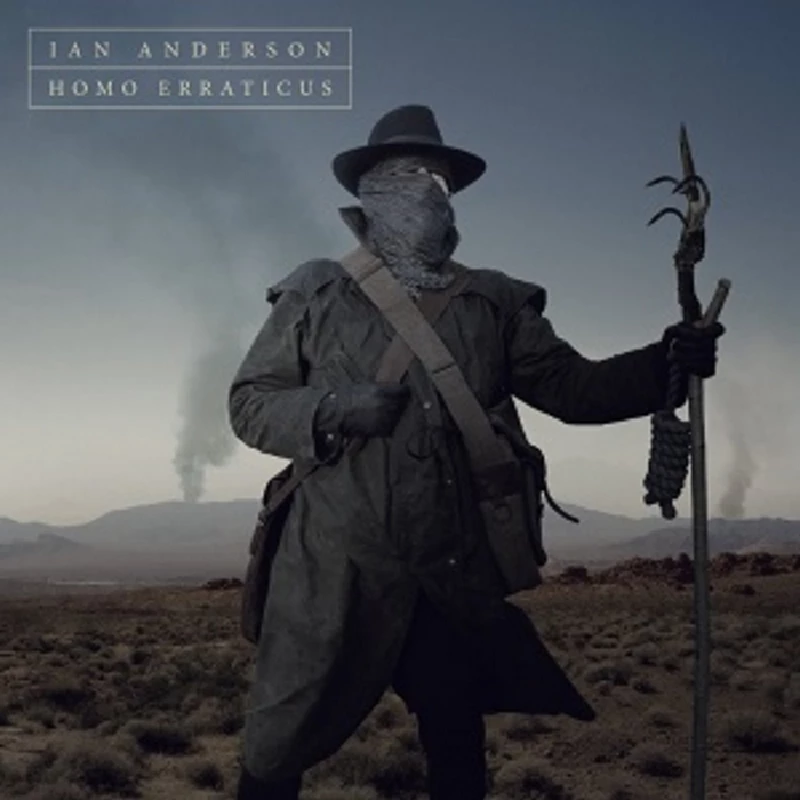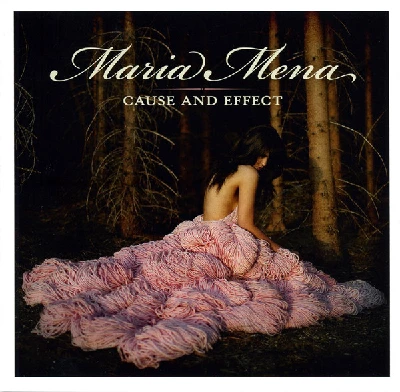Ian Anderson - Interview
by Lisa Torem
published: 24 / 2 / 2014

intro
Lisa torem chats to Ian Anderson, the front man with Jethro Tull, about his new solo album 'Homo Erraticus' and his forthcoming world tour
We were first introduced to prepubescent fictional sidekick Gerald Bostock when Ian Anderson’s Jethro Tull in 1972 released concept album, ‘Thick as a Brick’. In 2012 Anderson explored the divergent path the now middle-aged poet plummeted with ‘Thick as a Brick 2’. Currently Ian Anderson prepares for his band (guitarist Florian Opahle, bassist David Goodier, keyboardist John O’Hara, drummer Scott Hammond and singer Ryan O’Donnell) to cover more than twenty cities in the UK, after which time they will continue on to the US and other overseas destinations. Whilst on the tour, Anderson promises to include a set of Jethro Tull classics, he and the band will primarily focus on new studio album ‘Homo Erraticus (Calliandra)’, on which Bostock returns as songwriter/chronologist after dusting off a text by the late historian Ernest T. Parritt, who, with the zest of a prodigious private eye, scours through British history disclosing back stories of characters which include a Neolithic settler, a blacksmith, a monk and Prince Albert. True to form, Anderson’s palette absorbs sounds ranging from the pinings of Gregorian chant to an ethereal sound bite salad brimming with electric guitar and screeching keys. The prophetic album stretches the mind intellectually and musically and inspired this writer to first Google furiously far flung oddities like ‘Doggerland’ and ‘Elkin forests’. For 45 years, Anderson has been a fixture in the prog rock genre as front man, chief songwriter and multi-instrumentalist of Jethro Tull and as a solo artist. He is the man who made flute as integral to the genre as the electric guitar has been to rock ‘n’ roll. His command of acoustic guitar and mandolin and appreciation for Celtic music and non-Western modalities also punctuate his performances. Anderson has frequently brought international guest artists on stage and has written for string quartets and orchestras. His records sales have exceeded 60 million copies, and on top of countless other awards he recently received The Prog God Award from ‘Prog Magazine’. It is our third interview with Ian Anderson for Pennyblackmusic. As usual, he has his fingers in many pots and his ability to wax poetic on a great variety of subjects always intrigues. PB: Why have you decided to resurface Gerald Bostock for ‘Homo Erraticus’? IA: Well, it’s just a point of continuity. I think lots of writers employ certain tools, certain devices which can titillate, energise their listeners when they recognize something that is an old friend or just a reference to something that gives context perhaps to something new. To have characters recur is a commonly used device, and it’s not something that I frequently have done, but once in a while it gives a little bit of a link. In this case it gives a back story to the lyrics and the music which are clearly complex and conceptual in the extreme in rock music terms, to give it a context, to give it a story in which you can inhabit the heady scenario of 8000 BC to a time, let’s say, forty years into the future, That’s a tall order so you’ve got to construct a time line in the scenario that gives that some kind of credibility, but it’s a serious lot of little messages and observations on the history of mankind and our insatiable desire to go where the grass is greener and bash the locals over the head and we think that we want something that they already have. It’s the story of Planet Earth. We’re hunter-gatherers. We’re still damned with that insatiable desire to go where the woolly mammoth is plentiful. PB: There seems to be a great deal of room for improvisation on the album, a diversity of styles and some wonderful solo work. Now, Scott Hammond, for example, is a jazz drummer. Scott played on the album and is also on tour, isn’t he? IA: Correct. Scott Hammond and David Goodier are jazz musicians in Bristol, in the west of England. John O’Hara is a classically trained percussionist and pianist, so his background is somewhat different. Florian Opahle is a dandelion rock guitar player from Germany, and the combination is a good one because they all bring different skills and different histories, musically speaking, to the rehearsal, to the period of arrangement and to the actual recording. So, they keep up with each other. Some guys have a natural instinctive way of playing that others have to follow. Every day we all learn something new. That’s a good position to be in. You don’t want to be just recreating your stylistic past. You’ve got to constantly be trying new ways of expressing music, and improvisation is, of course, part of that mix that builds into the arrangement opportunities for all of the band members to stretch out a little bit; to go off piece in our own personal winter Olympics. PB: ‘Enter the Uninvited’ seems to me to have a ‘Twilight Zone’/Zappa feel. IA: I won’t say that I was thinking of any Frank Zappa references at all. It was just the way the music evolved based around, I guess, having some lyrics in my hand and working rhythmically in the context of the delivery of those lyrics. I decided to speak, rather than sing. That doesn’t make me a rap artist but it makes me appreciate the rhythmic use of words where melody can take a back seat because when the melody is operative then it’s quite a jumpy, little melodic line. Lots of melodies on this album are deliberately constructed with some tricky intervals to sing. You’ve got to pay attention, and you’ve got to be concentrating on what you’re singing. We’re not doing the blues here, We’re singing rather more constructive pieces perhaps more in the line of musical theatre than rock music. PB: I agree that you’ve created some very sophisticated themes. Your voice sounded excellent, as well, with a lot of emphasis on your high range. Have you been working with a coach? IA: No, I’ve been working on the coach. Sometimes I sit in buses or trains and refine elements of music because I’m used to working anywhere with my laptop computer. So, the travel experience, to me, is quite valuable because I can often sit and edit lyrics or write material for album covers or website stuff. It’s actually quite useful. I think the important thing is that when you go into rehearsal you’ve got a pretty clear idea of what you think you’re going to do, but it’s only when you start working with the other musicians that you refine those melodies and refine the shape of things. They changed really very, very little because in the time from the original demos that I made in a hotel back in March of 2013, which was the first time and the only time that I sang those songs, right up until the start of band rehearsals in November I didn’t sing them again. I just sung them very quietly in the hotel room because you can’t make a lot of noise and risk upsetting other guests, so that was the one and only time I sang them to make some little demos to send to the guys in the band. That, surprisingly, changed hardly little at all really, until the final moments of recording when the odd word was rewritten. It might have been the odd note that became juggled around a little bit to make me sing it more convincingly but it was 99 % what it was. You can hear for yourself if you get the big box set DVD collection because all the hotel demos are on that. We’ll let people see what I look and smell like. It’s as personal as that, to hear me working on the hotel demos with no one ever to hear them other than the other band members. I was kind of embarrassed to let these primitive gurglings and mumblings even go as far as the other musicians but I decided at the end; hey, this is part of the process, and there are some people who probably would be fascinated by how this developed. When I listened to them again many months later, I thought they sounded pretty musical, recorded using my Mac Book mic. It was the first ever rendition of that musical material from very sketchy notes to actually a performance, or be it, for no one other than myself and possibly the room mate who tended to invade at the most awkward of moments, but that was how I did it. So, it’s a chance for people to get really up close and personal, and it’s like watching me in the shower generously soaking my private parts. PB: So will you be following the album pretty closely on tour? IA: Well, it was written and arranged as a live performance, which is very much part of the rehearsal period. We tried at all times to play what we would then play live on stage, so it doesn’t involve a lot of additions or overdubs on top of things. There’s only usually one guitar playing at one time. There’s only one set of keyboards playing at any one time. The whole point was to try to make the band as live as you can in the studio with everybody playing on the backing track at the same time, but for obvious reasons I can’t be out there singing when we do the masters. I do in rehearsal, but when it comes to the recording I’m sitting in the control room pressing buttons. At that point, the guys are on their own. It was a good experience in the sense that you have a feeling of how you’re going to do it live and how it will sit one song in relation to the other because the continuity was a requisite part of the way we recorded it, so it was recorded in chronological order from beginning to end without deviation. Actually, it’s not quite true. There was one little minute on the last day of recording. I added another little piece of music, which was a piece to be inserted two thirds of the way through the album. That was an after thought. Other than that, it was all recorded in order and that’s obviously the way we would play it live onstage. PB: Should we expect some visual interpretation of the music, as well? IA: An hour from now I shall be turning my attention, again, to working on all of the video content and hopefully, by the end of this weekend that will all be written down. Some of the video will be shot by me and my son, and we will edit that during the next three or four weeks. Some of it is being tackled by other folks who work on our website, who are doing some of the material for the second half of the show: The Best of Jethro Tull, material, again, under my direction because they will get a detailed scenario of the way I see the scenario working, where and when in each song. Some of it is just freely dropped in in real time by our lighting operator. Some of it is running to a click, which means it’s programmed into a very specific, tightly coordinated place in the arrangement. So if something rhythmically very precise is happening you have to lock everybody in with some kind of audible click. The band will have to play along with a definitive time code, but that doesn’t bother me because I don’t actually take the click. In the monitors, I just follow the drummer. But he is constantly having to play with a click, which is annoying. So we have to let him off the hook sometimes and just let him play in free time and have video content and lighting cues, which are actually manually cued. They don’t have to be to the split second, so precise. It depends on the content, obviously, as to what you choose to do. PB: So you will be performing at approximately twenty cities in the UK. Will this concert influence the subsequent concerts? IA: It can’t because we have quite a long preparation period of about six weeks before we start the tour and by then all of the video material has to be locked down, all of the performance has to be locked down, the band rehearsals will have taken place, and then we go into production rehearsals with sound and lights and all of the crew, and at that point it is written in stone at least for the first week or two. There might be very minor changes or additions but you know you’re not in a position to keep chopping and changing. Production rehearsals cost a lot of money (Laughs). It’s twenty thousand dollars a day – it’s like doing a regular concert gig without the audience there to help pay for the cost. It’s a very expensive operation, so by the time we do our two days of full rehearsals, plus two technical days of set up and take down, we will have spent somewhere in the region of about $65,000 US dollars and that is money gone out before we even play the first concert. The cost of rehearsal is quite expensive. You’ve got to get it right – you can’t think, we’ll change it again next week. That’s not possible. The time involved in video and shooting video is all very time-consuming stuff and it goes at a snail’s pace, which is kind of annoying. Video editing is a very drawn out and detailed process, not one that I would ever want to get involved in other than as a supervisor. PB: How many people are you actually touring with? IA: We usually try and keep everything down to fifteen or sixteen people, maximum, because we try to use only one bus, which means there are usually fourteen people on a bus in the UK, and probably twelve on a bus in the USA because their buses are smaller than ours. So, it’s a modest tour. It’s not like some theatrical presentation like Lady Gaga. We run a very tight ship and, in fact, in many of the places that we play we have to take everything with us, in, essentially, check in luggage. There’s no airfreight involved anywhere we go. We’ve got to be very mobile, very flexible. Shipping stuff in between tours is a horrifically expensive and risky thing to do in this day and age. There are acts that still do that. I’m sure they often pay the penalty: enormous costs and the danger that they don’t get their equipment customs cleared and so much administrative work. So, everything we do and have done for years and years and years has been especially designed to travel as personal luggage. There’s a props case, which just contains clothing and shared props, and we can fill the props case and that’s it. There’s not going to be a second props case – there’s only one props case. There’s another case, which contains media servers and a screen and a keyboard. There’s a general production case, which has a certain amount of electronic stuff and paper work and material for the production office and most of us manage with our carry on luggage. I travel around the world and every time, whether I’m away for one day or three weeks, it all is in my carry on regulation size airline baggage and I’m a master at the art of careful and light packing. PB: Ian, you’re constantly cited as the musician who introduced flute to rock music. Is there a flautist to whom you would pass the baton one day? IA: I’m not really a listener. I’ve managed to get through most of my life without really listening to many other artists. I’m not, honestly, hugely up to date on who’s doing what. It’s not that it doesn’t interest me; I only have the capacity for so many hours of music a day. I’d rather be concentrating on my own music than stopping to listen to what other people are doing. There may well be bands or artists out there where I’ll think, that would be a fitting sequel to the Jethro Tull story, but I have no idea who they might be. And, in terms of playing the flute, as far as I am aware, no one has ever said to me, “Have you heard this new rock flute player?” I haven’t heard that one for a long time; not for about forty years anyway I’m not going to pass a baton to somebody. I don’t think I’d be passing a flute to anybody. PB: There has just been the fiftieth anniversary of when the Beatles first appeared on ‘The Ed Sullivan Show’. Do you have any memories of that appearance? IA: I think I’ve seen reruns of the Beatles on Ed Sullivan. He seemed to be a bit of a tyrannical guy. He would have you on his show and have you on again even if you weren’t that popular, but he would also have people on once and say, “That’s it. They’re never coming on the show again.” He was not the kind of guy you would probably want to cross swords with. Generally speaking, he didn’t have much option with the Beatles. He really had to put them on because they were huge. There were other people I know of who he had on his show who absolutely left the American audiences cold and yet he put them on two or three times. It was quite extraordinary – Ed Sullivan had Morecambe and Wise on, I believe, two or three times but as far as I know they never made any impact at all in America but he personally liked them. He thought they were great people and they loved him. So, they were buddies and he put them on the show. Ed Sullivan was rather like one or two hosts elsewhere throughout the world. He was not the only one, but he was more or less the only one. These days, I suppose, there isn’t a single equivalent. Four or five years ago, if you could get on Leno one week and Letterman the next week and maybe Conan O’Brien the week after that, that was about as big as you could get whether you were a musical act or a movie star. It was the same way in the south. The Grand Ole Opry was the big deal and they didn’t like Elvis. And there is now a picture in the backstage corridor of whatever the little theatre in Nashville is called where Elvis apparently played once and they said that was it – this guy’s never coming back here again. But with the passing of time, they realised their error and now they have a picture of Elvis shaking his very baggy trousers in a private place in the backstage corridor. But at the time they thought he was a complete jerk and a time waster and they were glad to never have him onstage again. So a lot of these folks are very powerful and they decide the fate of artists and other times artists succeed in spite of them. I’m sure there were a lot of people on ‘The Ed Sullivan Show’ who never appeared again who he personally didn’t like who went on to sell tons of records. PB: The Rolling Stones have often led us to believe that each tour is their last. If this were your last tour, would you let us in on it? IA: Well, I hope not. People at my age can’t be too overly enthused about the prospects of twenty years from now running around the stages of the world but the possibility exists for a few more years of active performance. It is the province of classical and folk musicians that they can continue into their eighties and that’s a possibility for a rock star who looks after himself or herself, which so often seldom occurs. Jagger is in good shape and, obviously, puts a great deal of work into preparing himself for tours. I’m not so sure that a couple of the other guys in the band will be so fortunate in terms of their health, but Mick Jagger is probably well capable of doing it for another five or ten years if he chooses to do it. It’s all in the hands of whoever decides which little microscopic cancerous cell is going to come and take its toll in the next months or years. It’s impossible to tell. I’m one of those people who don’t sit around waiting. I go every year for a number of health checks because I would rather know about these things and try to address them with some possible chance of survival; a chance of knowing what the future entails – so far so good. I haven’t had to address the issue of imminent mortality. PB: So, you know there is a colony in Mars being set up and the lucky few selected can purchase one-way tickets. I have heard that residents of the UK are not signing up in large numbers. Now your flute has already visited space. Would you consider making this trip? IA: I think that the people who entertain such notions are either very young and very deluded or they’re very old and they don’t give a shit. They probably fall into those two distinct camps. The reality is that - for a lot of folks who have been to space who know that they won’t fly again that they possibly just would sign up for something knowing they would never come back. I know one lady astronaut who would probably put her name in tomorrow, but she does have a twelve-year-old son to think about. It’s a tricky one and I don’t think in reality in my lifetime that we will ever see a manned mission to Mars because the cost is so enormous and even the slightest downturn again in the world economy would pretty much put pressure on anything of that sort. When I was at NASA at Kennedy Space Centre last year, NASA was still beavering away at new ideas and new technologies, some of which they were kind enough to show us. But the enormous budget it would take to make that come to reality – I personally don’t see that happening any time soon. It is work that goes on but it’s a colossal adventure. As we all know, Richard Branson has been attempting to have the space tourist quick trip up and down and suborbital flight ready for the last two or three years. He fails every time to get it to happen. So far he doesn’t seem any closer than he was two or three years ago with constant failure and a lot of huge difficulties. That’s just a high ride. Goodness me, there were folks back in the 1950s doing that in the Chuck Yeager (LT: Noted US Air Force test pilot, who became the first to travel faster than sound) years, so Richard Branson is kind of fifty years too late to convince people that there’s really space flight. It’s just a hop into the upper atmosphere. In reality, even the cost of orbital flight at its cheapest is, as we know, in the region of 35 million US dollars to hitch a ride on the up elevator and now to come back only the hard way -- since shuttle missions are no longer flying – it’s the Russians or nothing and it may well be that the Japanese or the Chinese introduce some economically competitive systems in years to come but space flight is absolutely not within the realm - it is fantasy. Signing up for a mission to Mars? I’ll be long dead before that actually happens. PB: So, you can cross that off your list of things to worry about? IA: I think you can cross that off the list. Frankly, if you ask me to get something off the top shelf using some three-foot high stepladders I’m probably going to have a vertigo attack. I doubt you’re going to get me on top of a Sawyer’s Rocket even if they don’t light the blue touch paper. I’d still be one hundred and fifty feet in the air and I’d already be saying, “I want to come down.” PB: Thank you. More information about 'Homo Erraticus' and the tour can be found at www.jethro-tull.com.
Article Links:-
http://www.jethro-tull.comBand Links:-
http://www.jethro-tull.comhttps://www.facebook.com/officialjethrotull
https://twitter.com/jethrotull
Picture Gallery:-



interviews |
|
Interview (2015) |

|
| Lisa Torem speaks to multi-instrumentalist and composer Ian Anderson, who is bringing to life the story of namesake and industrialist Jethro Tull in a brand new rock opera |
| Interview (2013) |
soundcloud
reviews |
|
Homo Erraticus (2014) |

|
| Challenging but both tongue-in-cheek and inventive solo concept album from Jethro Tull front man, Ian Anderson |
most viewed articles
current edition
Carl Ewens - David Bowie 1964 to 1982 On Track: Every Album, Every SongArmory Show - Interview with Richard Jobson
John McKay - Interview
Colin Blunstone - Thalia Hall, Chicago, 16/7/2025
Billie Eilish - O2 Arena, London, 10/7/2025
Bathers - Photoscapes 1
Visor Fest - Valencia, Spain, 26/9/2025...27/9/2025
Loft - Interview
Sir Tim Rice - Interview
Robert Forster - Interview
previous editions
Manic Street Preachers - (Gig of a Lifetime) Millennium Stadium, Cardiff, December 1999Heavenly - P.U.N.K. Girl EP
Beautiful South - Ten Songs That Made Me Love...
Oasis - Oasis, Earl's Court, London, 1995
Peter Perrett - In Dreams Begin Responsibilities Interview Part One
Prolapse - Interview
Coldplay - Wembley Arena. London, 16/8/2022
Boomtown Rats - Ten Songs That Made Me Love....
Trudie Myerscough-Harris - Interview
Pixies - Ten Songs That Made Me Love...
most viewed reviews
current edition
Davey Woodward - Mumbo in the JumboSick Man of Europe - The Sick Man of Europe
Lucy Spraggan - Other Sides of the Moon
Phew, Erika Kobayashi,, Dieter Moebius - Radium Girls
Amy Macdonald - Is This What You've Been Waiting For?
Bush - I Beat Loneliness
Suzanne Vega - Flying With Angels
Alice Cooper - The Revenge of Alice Cooper
Blueboy - 2
Cynthia Erivo - I Forgive You
Pennyblackmusic Regular Contributors
Adrian Janes
Amanda J. Window
Andrew Twambley
Anthony Dhanendran
Benjamin Howarth
Cila Warncke
Daniel Cressey
Darren Aston
Dastardly
Dave Goodwin
Denzil Watson
Dominic B. Simpson
Eoghan Lyng
Fiona Hutchings
Harry Sherriff
Helen Tipping
Jamie Rowland
John Clarkson
Julie Cruickshank
Kimberly Bright
Lisa Torem
Maarten Schiethart